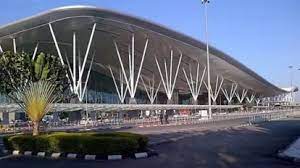Bengaluru Plans Second Airport: Location and Timeline Revealed
Karnataka’s Minister for Infrastructure, MB Patil, has unveiled plans for Bengaluru’s second airport, emphasizing considerations of passenger load and connectivity to the existing Kempegowda International Airport (KIA). The decision on the airport’s location is set to be finalized after thorough discussions and assessments.


Karnataka’s Minister for Infrastructure, MB Patil, has unveiled plans for Bengaluru’s second airport, emphasizing considerations of passenger load and connectivity to the existing Kempegowda International Airport (KIA). The decision on the airport’s location is set to be finalized after thorough discussions and assessments.
Patil highlighted potential locations based on these criteria, stating, “If passenger load is prioritized, areas like Sarjapura and Kanakapura Road are strong contenders. For connectivity to KIA, places like Tumkur and Dabaspete will be leading options.” These factors will be further deliberated in upcoming departmental meetings, followed by reviews with the Chief Minister and the cabinet.
The exclusivity clause currently held by Bangalore International Airport Limited (BIAL), which restricts the establishment of another airport within a 150-kilometer radius of KIA, is set to expire in 2032. This timeline potentially opens doors for the new airport’s construction by 2033, pending land acquisition and compensation processes that are already in the planning stages.
Drawing parallels with global cities like New York and London, where multiple airports coexist, Patil underscored the necessity for Bengaluru to prepare for future aviation demands. He also mentioned Tamil Nadu’s plans for an airport in Hosur, prompting a review of the applicability of the exclusivity clause with BIAL.
KIA, currently India’s third busiest airport after Delhi and Mumbai, handled 37.5 million passengers and over 400,000 tonnes of cargo last year alone. It is projected to reach peak passenger capacity by 2033 and maximum cargo capacity by 2040, necessitating proactive measures to accommodate future growth.
As Bengaluru continues to expand as a hub for aviation and commerce, the development of a second airport promises to enhance connectivity and alleviate pressure on existing infrastructure, ensuring continued growth in Karnataka’s economic powerhouse.
Sources By Agencies








Howdy! Do you know if they make any plugins to assist with SEO?
I’m trying to get my site to rank for some targeted keywords but
I’m not seeing very good results. If you know of any please share.
Thanks! You can read similar art here: Wool product
Howdy! Do you know if they make any plugins to assist with Search Engine Optimization?
I’m trying to get my website to rank for some targeted keywords but I’m not seeing very
good success. If you know of any please share. Cheers!
I saw similar blog here: Coaching
Start the day with the same breakfast you’ve had for the last few days.
Maintain your excessive fluid and sodium consumption, however add one hundred mg of potassium to your breakfast, lunch, and
pre-sleep meal. The sodium-potassium pump will allow you to retailer most
quantities of water inside your muscular tissues, pulling it from underneath the skin and storing it the place you need it to
be.
Raise a heavy weight for the prescribed reps,
rest two minutes and do it once more. You now have a brilliant
effective 12 week program to build muscle throughout both the
upper physique and the decrease physique. I’ve included some extremely powerful intensity enhancing
methods that will literally force your muscle tissue to renewed progress.
Yet, except you give attention to proper train type, you received’t get essentially the most out of
this or some other exercise program. When it comes to building lean muscle mass,
you want to concentrate on performing primary compound exercises.
On workouts 4-6, you will be repeating workouts
1-3, so purpose for more whole reps per RM set the
second time by way of. To perform the workout, clear the kettlebells to the rack position, then perform a set of army presses.
Then, whenever you’re prepared, clean the kettlebells back into the rack position and perform
a set of front squats. Active recovery days are kinda-sorta relaxation days, when you can do exercises which are less intense
than your exercise days, and also shorter in length.
The program has been thoughtfully composed via years of private experimentation,
consulting the research, and studying from consultants
along the way.
It’s a three-day training break up, by which you prepare three days,
rest one, prepare three, and so on. A basic type of coaching program based on scientific coaching rules and
real-life experiences by many bodybuilders
throughout the a long time. A 3-day split body workout could be
helpful to anybody, from the newbie to the extra superior bodybuilder.
If you are a beginner it can assist by getting
the body able to take the overload of future lifting by working the entire body with heavy weights.
With 4-day and 5-day exercise splits changing into
increasingly well-liked amongst the bodybuilding and health community, it appears
that 3-day splits are slowly dying away.
Focus On NANBF/IPE, INBF/WNBF, OCB, ABA, INBA/PNBA, and IFPA bodybuilding, noncompetitive bodybuilding, diets for the pure lifters, exercise routines and more!
All are welcome here however this sub is intended for intermediate to advanced lifters, we
ask that beginners utilize the weekly and day by day discussion threads on your wants.
If you’re on the lookout for an entire fullbody workout program
with difficult workout routines, I’ve obtained you covered!
See which of our ATHLEAN-X packages greatest meets
your health goals. Science helps the truth that stimulation and re-stimulation of muscle tissue
each forty eight hours produces probably the
most amount of muscle growth with the least
quantity of wasted time.
This template is designed for intermediate trainers, with
around 4 months or more worth of stable coaching expertise.
If you wish to do something utterly completely
different within the health club that will challenge you in a means
you’ve never been challenged, this could be a routine you want to strive.
Second, maximizing the development of a given muscle group requires
using several exercises, and never only one. If in doubt, err on the aspect of giving yourself an extreme amount
of rest somewhat than not sufficient.
The best part is any proper gym will have all the
gear you want to complete this workout. The best approach to do a 3-day full physique
exercise is to alternate days and alternate workouts. You ought to cycle by way of a minimum of
two different full body workouts and do them on alternating days.
Nevertheless, this split does permit for an extra exercise day,
that means you probably can match in more volume — and that
could be an even bigger driver of growth. A basic body
weight train for strengthening and building your abs, the crunch has been a mainstay in bodybuilders’
exercise routines for lots of decades. It’s straightforward to do, and you’ll adapt it
to your power stage by holding a weight in opposition to your
chest for added resistance.
Whether you simply want to experiment with one,
otherwise you want to incorporate each exercise periods right
into a sample exercise plan, you’re going to see big advantages from this full body coaching.
If you have been following our three day newbie split workout plan for
mass and learnt exercises appropriately. It Is okay to do a full body
routine each time if you are coaching three times per week, particularly for
a beginner routine. For more advanced lifters they might want to adapt their exercise break up type for larger energy features and muscle
mass.
This makes their exercise packages, not only ineffective, however straight-up
dangerous – due to overtraining and injury. Therefore, we suggest that
you simply pick one or two workouts per deltoid head (front, side,
and rear) to work your shoulder muscles completely, as we do in our shoulder exercise routine.
If the push press is more of an athletic energy
exercise, the seated dumbbell press is more of a bodybuilding train. Whether you’re a newbie or superior
lifter, these workout routines will help you pack on muscle and enhance your shoulder energy shortly.
The greatest hindrance many individuals have in achieving a excessive level of health
is a perception that you want to train usually
to see good gains. Ideally, you separate every coaching day by one restoration day with one two-day restoration break (generally the weekend).
It’s best to get in there and bust your rear three instances every week than to take a seat round and pout about the way you
don’t have time to go to the gym, and never go in any
respect. The problem increases as you progress by
way of the levels, so it’s necessary to choose on a load that’ll get you thru to the tip.
Nevertheless, when you do find it too intense, it’s okay to stay with the previous degree,
select a lighter weight, or increase the rest period.
Select weights that are heavy and take you to
fatigue with every set. For anybody trying to optimize mass,
enhance strength or simply enhance their health and conditioning ranges,
this provides a quick and efficient answer.
You’ll focus extra on compound exercises which
will allow you to incorporate extra muscular
tissues in fewer workouts. Make certain you’re focused and energized earlier
than every exercise. Since you’re only training three days, these workouts shall be
slightly longer (give yourself about an hour and 15 minutes every workout).
This is necessary as a end result of since you’re only training
3 days a week there might be sure issues you’ll wish to watch closely in your non-training days.
Juice and Toya label this as a high-intensity interval coaching (HIIT) exercise, however with dumbbells.
It’s more frequent to find HIIT sessions with out tools, or potentially some gentle weights, so
this routine is more like a high-intensity resistance training (HIRT) exercise.
It’ll take motivation and willpower to take per week off training after some
strong work in the fitness center for the earlier couple of weeks, however it’ll be value it whenever you see the outcomes.
But to optimize muscle mass you want to achieve a calorie surplus.
That method your physique has a reservoir of spare power to
tap into. Analysis reveals that you’ll still lay down new muscle cells even if you’re burning off more
energy each day than what you’re eating.
You’ll simply be doing three sets of this exercise, with
a focus on eccentric reps. However then we throw in a burn out set to completely annihilate the shoulders.
This 12 week mass building routine has been pared again to the 5 key compound moves that will get you huge quick.
Every train might be carried out for just 4 sets to offer you
a total of just 20 sets per exercise. Yet those 20 units will contain total depth and muscle blasting
effort.
The amount of rest you want between units is determined by a quantity of factors, including the depth of the train, how heavy weights
you’re using, and your fitness level. A power coaching session elevates your muscle protein synthesis (MPS) for round a day for someone with some coaching expertise.
After somewhat greater than 24 hours, you’re back at baseline.
The program for tree-trunk quads, bulging biceps, and a large back.
This is a sophisticated bodybuilding program and one of the well-liked programs in our
exercise tracker.
Carbs usually are not important vitamins and have no direct muscle-building properties.
Nevertheless, they are your primary gasoline
throughout high-intensity exercise like weight training.
Experienced bodybuilders use advanced training
strategies to break by way of plateaus and improve their exercise
depth. Compound workout routines just like the squat, rows, and presses take a lot out of you.
Training your complete physique 3 times per week lets you learn the exercises by
performing them frequently whereas supplying you with enough time for relaxation and restoration to develop.
3-day splits are probably better for bulking and maintaining.
But the most important side of bulking, chopping or sustaining
is one’s food plan. You can have one of the best
coaching program on the planet but if your diet is lower than par then you’ll not make features.
This must be your favourite day because this is whenever you pack on mass from those squats that work these giant leg muscle tissue and release development hormone all through your physique.
Your base also will get stronger and you might be able to raise extra next week!
Have a cheat meal the following day as a reward for going via
this punishing and painful week.
If you need to maintain, there ought to be no caloric excess or deficit.
If you wish to minimize, there must be a caloric
deficit of about 500 energy per day, but often no more.
When you chop, you don’t need to lose muscle, you need to lose
fats and sometimes dropping more than 1 lb per week ends
up in some misplaced muscle.
Mass marked exercises are people who allow you to build crude muscle mass and strength.
Isolated workouts are those who isolate the muscle permitting
you to target its full vary of motion. For power gains, you
can go decrease than this and use heavier weights; about
1–5 reps per set is probably the best for power.
This is bodybuilding, not powerlifting, so make certain to maintain constant rigidity
in your muscles throughout the complete set. Contract your muscular tissues on the high phase instead of
resting. You keep constant muscle pressure throughout, improving your “mind-muscle connection” by focusing that tension on the targeted muscle tissue.
There isn’t any method that even the typical intermediate trainer can recuperate from this quantity naturally.
You don’t must hammer just one or two muscle groups per workout, nor do you want to hit the health club each single day.
You May need to dial in your coaching for the features you want—and that starts by structuring your workouts proper.
All three ingredients and extra are included as clinically efficient dosages in ALTIUS pre-workout.
And finally, carbohydrates and fats can fluctuate based mostly on your
own personal preferences. Nevertheless, most people
will find they really feel best on one hundred grams
of carbs or higher per day and no fewer than zero.35 grams of
fat/lb per day. On most natural bodybuilding packages, your intake of each of these
vitamins shall be higher than these numbers.
In addition to that, a smaller part of your program
should be directed in direction of isolation exercises, utilizing lighter weights and brought into the upper rep range.
However that’s not promoted as much as new exercise ideas like
CrossFit. These different programs may be are nice for different targets, but not for
bodybuilding. If you wish to get jacked, however
can’t ignore those basic bodybuilding exercises and ideas that go
together with it. The truth is that actual bodybuilding exercises
have not modified that a lot over the a long time.
Those compound workout routines are what have built great stage-worthy
physiques again then and right now. You’ll notice some workout routines have “Rest Pause” that means you may perform a rest-pause set on your final set.
Nonetheless, the experience of a totally equipped gym could be
helpful or motivational, particularly as quickly as you’re previous
the newbie stage. The possible exceptions are
the biggest of the professional bodybuilders with so much muscle mass that transferring it around takes
lots of effort. You won’t find yourself in that position if
you don’t need to. The man is an animal and large freak measurement humans have been trendy in the sport of physique constructing at that
time.
Go for 4 grams per kilogram of physique weight spread
over the day. Add a gram of vitamin C, a natural diuretic,
if your stomach can deal with it. If you’re a beginner, I will suggest that you simply don’t even consider using steroids.
Your physique will reply to bodybuilding coaching and proper nutrition without drug use.
References:
anabolic steroids where to buy (Finlay)
I am extremely inspired together with your writing skills and also with the format on your weblog. Is that this a paid subject or did you customize it yourself? Either way stay up the nice high quality writing, it’s rare to peer a great blog like this one today. I like theentrepreneurbytes.com ! It’s my: HeyGen
70918248
References:
Powerlifting steroid Cycles (https://repo.gusdya.net/)
70918248
References:
is dianabol a steroid (Kristan)